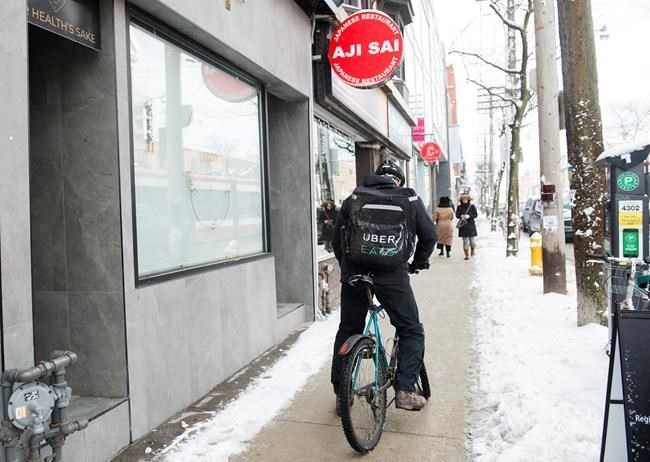
An Uber Eats courier is pictured as they pick up an order for delivery from a restaurant in Toronto, Thursday, Feb. 27, 2020. THE CANADIAN PRESS/Nathan Denette
May 06, 2020 - 10:02 AM
Every day around 5 p.m., Daniel Yoon straps on a mask, gloves and a backpack full of Lysol wipes and starts his nightly delivery shift with Uber Eats.
The job has the Toronto-based courier biking between 70 and 80 kilometres per day, incentivized by the per-delivery payment model. He typically works until 8 or 9 p.m., when both tips and order volumes are at their peak. After app fees and before tips, he makes around $6 per delivery, but with tips he can pull in upwards of $30 an hour.
For many couriers, delivering food is a steady, full-time job in a volatile job market — though one that comes with its fair share of risks, especially during a pandemic. Tips can be the deciding factor in whether couriers step out to work on any given day, Yoon says, making the consumer choice to add a gratuity more important than ever.
What constitutes a fair tip in the age of COVID-19, however, is complicated. The industry standard of 15 per cent has seen upward pressure in recent years, with some establishments making 18- or 20-per cent the default tip option on credit card machines, arguing the lower number hadn't kept up with the cost of living. And that's before factoring in the current climate for restaurants, which have seen revenues dry up while dining rooms are closed.
To Sylvain Charlebois, professor and senior director of the agri-food analytics lab at Dalhousie University, the decision to continue delivering amid a global pandemic is "almost heroic."
"Let's face it, a lot of federal programs are very generous," he says, noting that this aid was designed through a public health lens to make staying home the most enticing option for many. "In restaurants and food service, where tipping is involved, I actually do think that people feel that they have a duty to make these jobs attractive, so we can keep on getting the food we want delivered at all."
If Canadians neglect tipping, delivery work could lose allure and restaurants will be hard pressed to get their food to customers, making a difficult situation even worse.
Louise Fox, etiquette expert and founder of The Etiquette Ladies says tipping is "even more helpful to the person who's delivering" than it's ever been. But simultaneously, she acknowledges that "everybody's a little bit strapped," making it difficult to establish a set rule about how much to tip.
"Give it a good thought and think 'what if that was you and you were dependent on that income?'" Fox says. "Be a little bit generous and couple that with some common sense for your own situation."
Yoon says he holds no hard feelings against people who can't tip at all. When so many have lost their jobs, feel trapped indoors, and have difficulty making it to the grocery store, he's sympathetic to those who order in as a way to cope.
"If you can't afford it, but hey, you want to enjoy food once in a while, why not," he says. "To me at least, eating's one of the best things in the world, and why limit yourself because you can't tip?"
But he also notes that this work is hard, risky, and on rainy spring days, difficult to justify doing. Tips help.
"If you tip, even a couple cents or one dollar, that's great," he says. "If you can't afford it, that's totally fine too."
This report by The Canadian Press was first published May 6, 2020.
News from © The Canadian Press, 2020